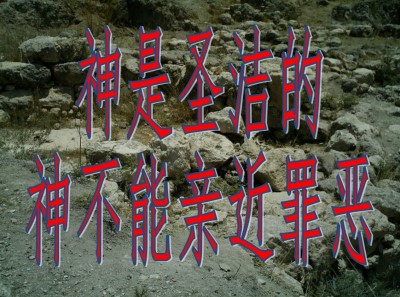 神为什么击杀乌撒?
神为什么击杀乌撒?
撒母耳记下6:1-11
神的恩典吸引我们相信他、爱他、服从他。谈到神的恩典,我们时常只想到神的爱,耶稣的十字架,我们罪孽得到饶恕等。很少有人告诉我们神处罚世人也是他表示他的恩典的方法之一。这种恩典(处罚)就是本文的主题。
在旧约圣经撒母耳记下第六章,大卫王把神的约柜,从巴拉犹大移到另外一个地方时,“…拉车的牛差一点绊倒了。乌撒就伸手扶住上帝的约柜。主上帝因乌撒的冒犯,向他发怒,击杀他。他就死在上帝约柜的旁边…”(撒母耳记下6:6-7 《圣经:现代中文译本》。
爱世人的神怎么能够处罚好意扶持约柜的乌撒?这不残忍吗?神的恩典在哪里呢?
请让我提出以下的原则帮助我们理解神的作为,和他为什么这样审判乌撒。
1. 神的恩典和慈爱都跟他的圣洁有关。只有一位十全十美的神,一位圣洁的神,一位与罪孽无关的神,才能施恩给世人。
2。关于神的圣洁,有一点使得我们惊讶、吃惊、害怕。那就是神的圣洁是带有能力的;神的圣洁蕴藏着力量。因此,神的圣洁很危险。神的圣洁使得我们敬畏他。因此,我们不要以为神只会施恩,而不会惩罚世人。我们说要敬畏这位圣洁的神的意思并不是说我们要躲避神,乃是叫我们敬畏神,顺服神。
请让我打个比方:电流对人类很有用处。但是,我们必须“敬畏”电流,不然它会害死我们。我们天天用电。大部分人从小都接触电力,但是没有人说,“因为我用电,用了四十年,所以我对电流非常随便。我可以‘玩’它;我不怕”。我们对汽车、飞机、汽油都是一样的。不可以说,因为我开车,开了二十年,所以我对汽车很随便。我们越了解汽车的结构,使得我们越尊敬汽车和设计汽车的工程师。同样,我们在神的面前不可以随便。不可以“玩”神的恩典。不可以说,“我成为基督徒已经有三十年,所以我不必敬畏神。在他的面前我可以随便一点。他的圣洁不会让我害怕”。不是。相反的,我们越理解神的本质,包括神的圣洁,我们因而越来越敬畏这位伟大,愿意施恩的神。
乌撒早知道神的约柜代表神,而且神已经明确地规定,因为约柜等于是“神所在地”,所以任何人都不能靠近约柜,更不能触摸它。我想,如果神是有形有体的神,乌撒就不敢伸出手来摸神的身体,所以,同样的道理,他也不应该伸出手来扶持神的约柜。
我曾经见过不同国家的总统。三次我在某国总统的面前。一次离他很近(不到一公尺的距离);两次离他比较远(几公尺的距离)。但是,我太太跟总统握过手。总统周围有警卫员(保镖)。他们的责任只有一,没有二——他们要保护总统。每次我在总统的范围内,如果我伸出我的手来想要摸他,警卫员立刻会制止我。譬如总统跌倒,我伸出手来扶持他,警卫员会让我知道那是他们的责任,而不是我的责任!今天在某些国家,如果有人试着亲近总统,他马上就会被枪毙!所以,乌撒违反神的圣洁,他侵犯神的座位。有罪而属于肉身的人污染了那即圣洁又永恒的神。因此乌撒以命报偿。
3。神对“不尊敬”一词的观念和定义与我们不一样。我们应该接受神对“不尊敬”与“罪”的定义,而尽量不做任何让神不高兴的事情。乌撒不认为他的行动对神不尊敬,但是他的行动违反了神的诫命。
4。我们可以假设乌撒肯定是“好意”。今天,我们说“我们好意”不是好藉口使得我们轻视神的圣洁,而不受惩罚。因为我们爱神,所以我们要顺服神,要让神高兴。既使我们觉得神的某些诫命“没意思”、“太过分”、“不必要”时,我们对神的爱和信心还是应该使得我们敬畏他,顺服他。乌撒的动机是“好意”,但是他的“好意”不能超越神的权威、圣洁和诫命。
今天基督徒把神看为天上的“天父”,把耶稣基督称呼为“长兄”。 我们唱诗歌说,“耶稣是我最好的朋友”,赞美神说,“他居住在我们的心中”。没错!但是我们不要忘记神还是那位高高在上者,是创造天地万物人类的上帝。神是圣洁的,所以我们要敬畏他,要顺服他一切的诫命。

图片:公元前二千多年迦南地的城门;之后这就是以色列伯示麦。Photo: Taken in Beth Shemesh, Israel, this city gate goes back to over 2000 B.C. and predates the Israelite occupation of Canaan. ©Photo by Edward Short.
《圣经:现代中文译本》THE HOLY BIBLE: Today’s Chinese Version, published by the Hong Kong Bible Society. © United Bible Societies, 1979.)
Uzzah and God’s Holiness
2 Samuel 6:1-11
The grace of God draws us to believe in him, love him and obey him. When we speak of God’s grace, normally we think of his love, the cross of Jesus and how God forgives our sins. Rarely are we told that the punishment of sin is also an expression of God’s grace. Punishment as a form of grace is the subject of this article.
The sixth chapter of 2 Samuel records how King David moved the ark of God from Balle-judah to another place. “…Uzzah reached out his hand to the ark of God and took hold of it, for the oxen shook it. The anger of the LORD was kindled against Uzzah; and God struck him there because he reached out his hand to the ark; and he died there beside the ark of God” (2 Samuel 6:6-7, NRSV).
Why did this God who is said to love all people punish well-meaning Uzzah for reaching to steady the ark? Is this not cruel? What happened to God’s grace?
Allow me to submit the following principles to help us understand God, and his act of judgment toward Uzzah.
1. God’s grace and love are connected to his holiness. Only a perfect and holy God, one who has no contact whatsoever with sin, can extend grace to mankind.
2. There is one element of God’s holiness that surprises and scares us. God’s holiness is powerful! Because it’s so powerful, it’s also dangerous; because it’s dangerous, God’s holiness causes us to honor, respect and revere him. Consequently, we should not assume that God can only dispense grace, but that he’s unable to exact punishment. To respect this holy God does not mean that we avoid God, but rather that we respect and obey him.
Let me give some examples of what I mean. Electricity is very useful to mankind, but we must “respect” electricity, otherwise it will kill us. We use electricity every day, and most of us have done so since we were small. But no one says, “Since I’ve used electricity for forty years, I can treat it very casually. I can play with it without fear.” The same is true for automobiles, airplanes and fuel. I mustn’t say that because I’ve driven a car for twenty years, I don’t have to be careful. The more we understand what makes an automobile go, the more we appreciate cars and the engineers who design them. Likewise, we shouldn’t be so relaxed in the presence of God; we can’t take God for granted, or “play” with his grace. One must not say, “I’ve been a Christian for thirty years, so I need not stand in awe of God; I can be a bit laid-back in his presence. His holiness doesn’t scare me.” No, no. Rather, the more we understand the nature of God, including his holiness, the more we’ll stand in awe of this great God who wants to extend his grace to us.
Uzzah knew that the ark represented God, and that God had explicitly stipulated that because the ark was where God “resided,” therefore no one could go near the ark, much less touch it. I think that if God had a body, Uzzah would not have dared to extend his hand and touch God himself. Similarly, he should not have extended his hand and touched the ark.
I have been in the presence of a head-of-state three times—once within two or three feet of a president and twice within several yards. My wife once shook hands with a president. Each time there were body guards close by, and it was their duty to protect their president. Had I reached my hand toward the president, I would have been restrained immediately. Even if he had stumbled and I had reached to catch him, the body guards would have indicated in no uncertain terms that he and his problem was their responsibility, not mine. In some countries today, if anyone were to approach the head-of-state without permission, he would be shot. Should it surprise us then, that when Uzzah presumed to violate the holiness of God—to contaminate the divine and immortal with the profane and physical, that it cost him his life?
3. God looks at “disrespect” and interprets it differently from the way we do. We should accept God’s definition of disrespect and sin, and should do our best not to do anything to cause God to be unhappy with us. Uzzah didn’t think his own action was disrespectful, but, in fact, what he did broke one of God’s regulations.
4. We can assume that Uzzah acted with good intention. Today, simply saying, “My intentions are good,” is not an excuse for us to disregard God’s holiness, and thus be able to avoid punishment. Since we love God, we want to obey and please him. Even though we think that some of God’s commands are meaningless, excessive or unnecessary, our love for God and our faith in him should cause us to respect and obey him. Uzzah’s action stemmed from a good motivation, but his “good intention” couldn’t supersede God’s authority, his holiness or his commandment.
Today, Christians call God “heavenly Father,” and refer to Jesus Christ as “older brother.” In hymns we sing, “Jesus is my best friend,” and we praise God as he who “lives deep in my heart.” And all that’s correct! But we mustn’t forget that God is also the high and lofty one who created the universe and all that exists, including us. God is holy, so we must respect him, and obey all of his commandments.
乌撒与神的圣洁
撒母耳记下6:1-11
作者:谢德华 ©By Edward Short
Uzzah and God’s Holiness
2 Samuel 6:1-11
